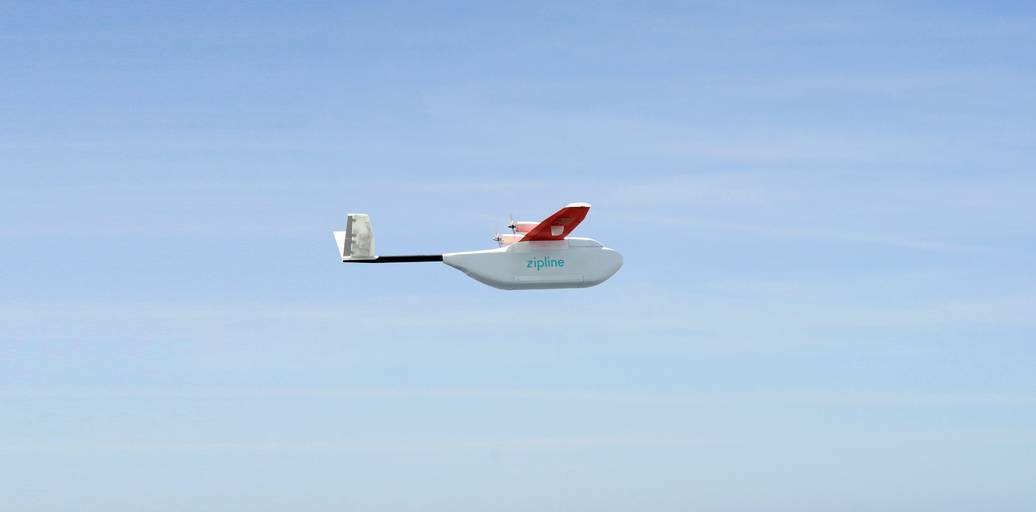Meet the drones that will be delivering blood and medicine to hospitals in Rwanda


Where the roads don’t go, the skies do. Starting later this year, hospitals and clinics in western Rwanda that are difficult to reach on the ground will be able to receive important medical supplies via delivery drones.
Zipline, an American startup company, recently signed an agreement with the Government of Rwanda to provide all last mile blood deliveries in the country. Those potentially lifesaving packages will be airlifted to their destination by Zip, the company’s high-speed, autonomous aircraft.
According to Zipline CEO Keller Rinaudo, the fixed-wing fliers weigh in at approximately 20 pounds and capable of carrying several additional pounds of cargo while covering nearly 75 miles round trip on a single charge. Zip lives up to its name, traveling at around 180 miles an hour to reach its destination, which is dictated by an onboard SIM card. The crafts can even stay airborne through elements like strong winds and heavy rain.
“We deploy these vehicles in modified shipping containers that we call Nests, which are set up next to existing medical warehouses in the countries we operate in,” Rinaudo explained. Nests contain between 10 and 15 Zips, each of which will perform between 30 and 60 deliveries per day to 22 transfusing facilities located in the Western half of Rwanda.
“Zips takeoff and land at the Nest, and make deliveries by descending close to the ground and air dropping the package to a designated spot at a health center which we call a mailbox,” Rinaudo said.
The Zips will be a welcome addition to the country’s infrastructure. The World Health Organization (WHO) estimates that one-third of the world’s population lacks access to essential medicine and nowhere is that impact felt more than in Africa, where the figure can skyrocket to as high as half the citizenry.
The numbers are even worse for women and children, who too often pay with their lives for a lack of access to basic care. Nearly three million children under age five die every year from lack of access to basic medical needs, while 150,000 pregnancy-related deaths could be avoided each year if mothers could reliably receive safe blood. Africa in particular suffers from the the highest rate in the world of maternal death due to postpartum hemorrhaging.
“Increasing access to lifesaving blood transfusions is critically important for women across the continent,” Rinaudo said.
While women will be considerable beneficiaries of the improved method of delivery, blood transfusions are vitally important to every part of the population. Rinaudo explained that 50 percent of all blood transfusions in the country are for primary pulmonary hypertension and 30 percent are for children with anemia from malaria.
Rinaudo’s plan to use drones to overcome infrastructure challenges for medical deliveries came during a visit to the Ifakara Health Institute in Tanzania in 2014. At the institute, which is one of Africa’s most prominent health research organizations, he spoke with a graduate student who had built a mobile alert system for health workers to text emergency requests for medicine and vaccines.
“Health workers had made thousands of emergency requests, that were not possible before thanks to this system,” he said. “Unfortunately, there was no way for the government to fulfill these requests. We were looking at a database of death with thousands of names, addresses, ages, phone numbers.”
Zipline is designed to be the other half of the system, the fulfillment center that will receive those emergency requests and be able to respond by delivering the necessary supplies with unprecedented speed.
In a nation like Rwanda, where the technology infrastructure is considerably less developed than in other parts of the world, it can be hard to imagine such a system operating. But, according to Rinaudo, it’s actually easier to launch a program like Zipline in a developing country than in a place like the United States.
“In places where the medical needs are extremely urgent, and the airspace is less complex, there is more willingness to innovate,” he explained. “Rwanda has leapfrogged bigger and more technologically advanced countries like the United States and now leads the world in UAV innovation.”
The prospects for autonomous delivery drones are still muddled in the United States, where regulatory bodies and commercial interests are competing to define the rules for such services and attempting to cut up airspacethough the products being delivered by the unmanned aircraft would, in most cases, be bringing items that are superfluous rather than essential.
July 2016 marks the date of liftoff for the Zipline system. According to Rinaudo, once the company has fully rolled out its service to the Eastern portion of the country in 2017, Zips deploying from the Nests will be able to fulfill country-wide delivery requests for essential and lifesaving medicines in 30 minutesor less for nearly all ofRwanda’s 11 million citizens.
“This system will save thousands of lives and dramatically increase the standard of care and access to medical products for millions of Rwandan citizens,” Rinaudo said.
Rwanda will be the biggest test case for Zipline, but it won’t be the only one; the company will be expanding its services to other developing countries later this year as well.
H/T Engadget
Photo via Zipline (CC-BY)
Read more: http://www.dailydot.com/technology/zipline-drone-medical-delivery-rwanda/